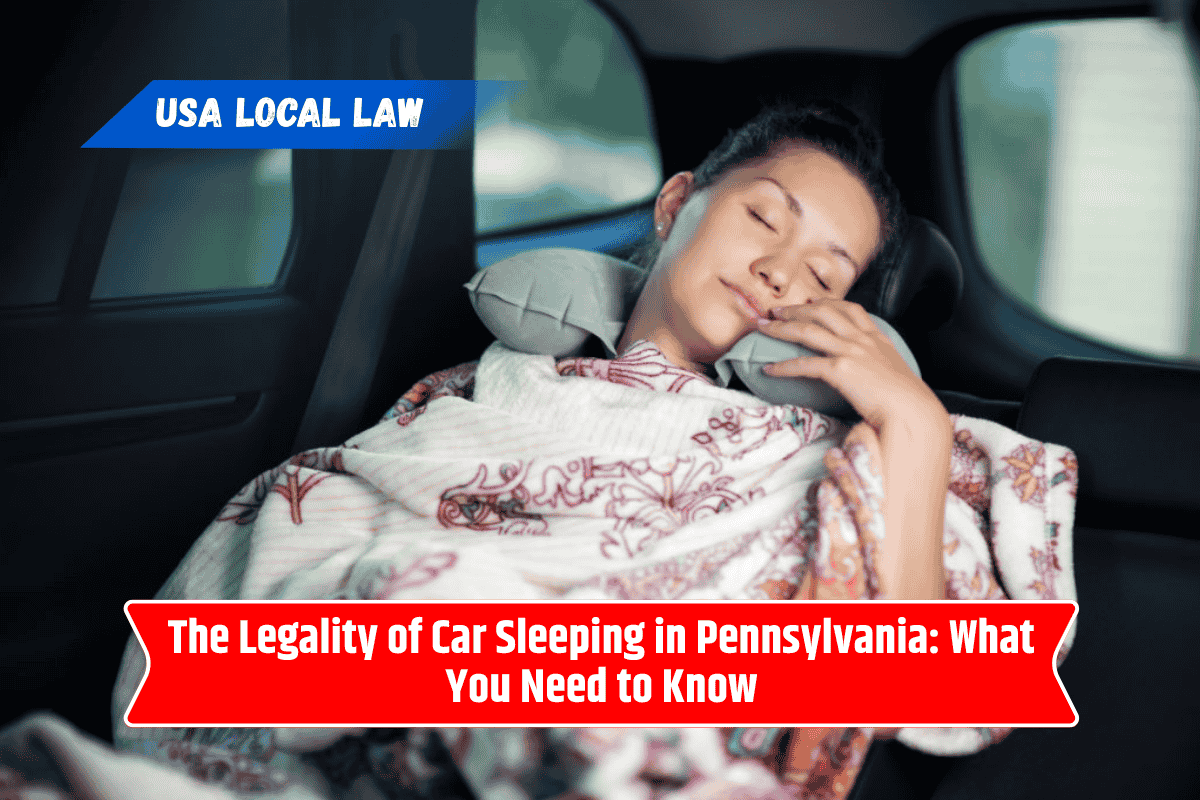If you’ve ever been on a long road trip or simply needed a place to rest while traveling, sleeping in your car might have seemed like a convenient option. However, not all states and cities are welcoming to car sleepers.
In Pennsylvania, the legality of sleeping in your car depends on various factors such as where you park, whether you’re on public or private property, and your personal safety. In this article, we’ll explore what you need to know about the legality of car sleeping in Pennsylvania.
Is It Legal to Sleep in Your Car in Pennsylvania?
In general, Pennsylvania does not have a statewide law that outright bans sleeping in your car. However, certain rules and local ordinances can make it more complicated. Here’s what you need to know:
- Public vs. Private Property:
The first thing to understand is the distinction between public and private property. If you park your car on private property (such as a private parking lot, a friend’s driveway, or someone else’s land), it is up to the property owner whether you can sleep in your car.
Without permission, you could face trespassing charges, even if you are simply trying to rest.On public property, such as street parking or public parks, there may be local regulations that limit how long you can park or whether overnight parking is allowed.
Many municipalities have ordinances that prohibit overnight parking, especially in areas where it might be disruptive to the community. - Rest Areas and Truck Stops:
Rest areas on highways are usually one of the most common places where drivers stop to sleep, and in Pennsylvania, you are allowed to park at rest areas overnight. These facilities are specifically designed for drivers to take breaks, rest, and sleep.
However, be aware that Pennsylvania’s Department of Transportation limits the amount of time you can park at rest areas. Usually, the time limit is 8 hours, but you should check for any specific signs or guidelines posted at the location to avoid violations. - Camping Regulations:
Many people sleep in their cars while camping in Pennsylvania. While camping is allowed at designated campgrounds and parks, sleeping in your car in non-designated areas is typically not allowed.
You can’t just park your car in a forest or park and expect to camp out overnight unless the area specifically allows for it. Always check local regulations or obtain a permit if you’re planning to camp in areas that permit sleeping in cars. - City-Specific Ordinances:
Some cities in Pennsylvania have more stringent rules about sleeping in cars. In places like Pittsburgh, Philadelphia, and smaller towns, parking overnight on the street may be restricted, or you may face fines for violating parking ordinances.
For example, many cities have “no overnight parking” policies for certain areas, especially in residential neighborhoods or busy commercial districts. It’s essential to be aware of signs or local regulations to avoid fines or potential legal issues.
Safety Considerations When Sleeping in Your Car
Even though car sleeping may not be strictly illegal in some circumstances, there are safety risks involved. Here are some things to keep in mind:
- Avoiding Unlawful Parking Areas:
As mentioned, staying in areas where overnight parking is prohibited could lead to fines, towing, or even being asked to leave by law enforcement. Make sure you’re parked in areas where overnight stops are allowed, such as official rest areas, truck stops, or campgrounds. - Personal Safety:
If you do choose to sleep in your car, your safety should always be a priority. Lock your doors, park in a well-lit area, and avoid sleeping in areas that might be unsafe or isolated. Avoid sleeping in your car in places that attract a lot of foot traffic or that seem sketchy, such as areas with high crime rates. - Windows and Ventilation:
It’s essential to keep your car properly ventilated, especially if you’re sleeping in it overnight. This is important for avoiding carbon monoxide buildup, which could be dangerous if your car is running or if you’re using any heaters or air conditioning. Always leave your windows slightly cracked open for fresh air while sleeping. - Respect Local Laws and People:
Be considerate of the people around you. If you’re parking in a residential area, make sure your presence doesn’t cause a disturbance. Sleeping in your car in a neighborhood where it’s not allowed could make you a target for complaints, which could lead to fines or being asked to leave.
Alternatives to Sleeping in Your Car in Pennsylvania
If you’re planning to be in Pennsylvania for an extended period and want a safe, legal place to sleep, consider some alternatives:
- Campgrounds:
As mentioned earlier, campgrounds and parks are great places to sleep overnight. These locations are designed for people who want to camp and sleep in their cars or tents. - Airbnb or Hotels:
If you’re on a road trip or visiting for a few days, staying in an Airbnb or hotel can provide a much more comfortable and safer alternative to sleeping in your car. - Rest Areas with Overnight Parking:
Some larger rest areas along highways allow overnight parking, and they often provide facilities like restrooms, benches, or picnic tables. These areas are designed for short stays, making them a much better option than parking in an unknown or prohibited area.
While sleeping in your car in Pennsylvania isn’t outright illegal, the rules governing where and how you can do it vary depending on local laws, the property type, and your specific situation.
Make sure to check the regulations in the area where you’re parking, especially when it comes to overnight parking rules in cities or towns. Always prioritize safety, both legally and personally, when choosing to sleep in your car.
